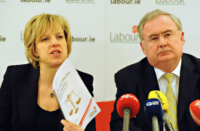Comrade Gearóid Ó Machail, SIPTU NIDC Workplace Representative and National Executive Committee member of the Communist Party of Ireland, succeeded in having the below resolution passed at the recent NIC-ICTU Biennial Delegates Conference in the Guildhall, Derry.
This motion calls on ICTU to lead an active campaign to highlight and address the devastating social and economic impact of NHS waiting lists on working people and their families in the North of Ireland.
The NI health service’s current “critical situation” comes after almost a decade of worsening waiting lists for elective care.
The number of patients on waiting lists for medical care and surgery appointments currently equates to more than a quarter of the population of Northern Ireland.
The NI Audit Office has stated that: “Waiting list performance levels are significantly worse in Northern Ireland compared with the other UK regions.”
SIPTU NIDC calls on ICTU to launch a campaign strategy calling for an end to the two-tier healthcare system in the north, for increased north-south cooperation between health and medical services across the island and for the allocation of urgent funding from the UK Government to both clear patient backlogs and drive longer-term health and social care transformation.
—————————
There cannot be any sentient being in this room who is not acutely aware of the nightmare scenario currently playing out on many of our hospital wards, demoralising our frontline service workers, wreaking havoc in our A&E departments and generating misery, anxiety and despair across the wider community when it comes to the impact of the appalling and disgraceful waiting times for NHS medical treatment and surgery appointments here in the north. There’s an immeasurable and immoral human toll being paid by workers, carers, vulnerable people and their families across our society as a result of the inhumane and two-tier approach to healthcare that is now considered the norm in a warped world where human decency and social obligation has been skewered on the petard of a capitalist value system that prioritises monetisation and profit above all else.
NHS waiting lists here have grown by 216% from March 2014 to March 2023. We hold the unenviable, pitiful and shameful record of the longest hospital waiting times among all the NHS regions in GB and NI, with tens of thousands of working people struggling to get the treatment they urgently need. The waiting lists are now twice as long as they are in the south which itself is experiencing chronic and unacceptable waiting times.
More than a quarter of our population here is on an NHS waiting list: waiting for an appointment or waiting for an operation. Have a think about that for a minute: 1 in every 4 people needing, but unable to obtain, medical care. What have we come to as a society?
There is a shocking graph in Stormont’s recent Draft Programme for Government that illustrates the alarming increase of patients waiting for a first consultant-led outpatient appointment, from an unacceptable 77,000 in 2009 to a frankly appalling 429,000 in 2024. What a damning indictment and derogation of duty to the citizens of this region? How and when did we become the type of people who take this lying down?
Over a third of patients here are waiting more than two years for medical treatment, a figure drastically higher than the single digit percentages seen in England, Scotland and Wales. As trade unionists, if not socialists, we should be ashamed that we continue to tolerate this indignity, comrades.
Years of neoliberal austerity, ideologically driven under-investment in social services, politically-manufactured staffing shortages, and creeping privatisation have all created an unprecedented crisis in a national health service, formerly free at the point of entry, that was once the envy of Europe. Needless to say, working class people here are again bearing a disproportionate share of this policy driven crisis.
Up until the recent British election, the Tories were gleefully intent on exacerbating this crisis with further privatisation, further outsourcing and deeper cuts in NHS funding, despite the very obvious and increasing demand for services: real cuts that would have led to even further degradation, further destabilisation and further destruction of an NHS already on its knees. Of course, the same Tory Ministers, full of Bullingdon bravado, who were plotting this destruction have ready access to the very best private medical care that inherited wealth can buy, and they are of course very often linked to those parasitic vested interests who profit immensely from increasing privatisation and lucrative government outsourcing contracts.
The real-life effects of prolonged and protracted NHS underfunding have real-world and devastating impacts for the working class.
- Staff shortages on our hospital wards, in our clinics and in our social services
- Safety compromised across the public health sector
- Delays to treatment – sometimes fatal
- Deskilling of the workforce
- Crumbling NHS infrastructure
- Cuts to essential and desperately needed frontline services
- Reductions in training and recruitment
- And a grim, morbid process of rationing services to none but the most chronically needy
There is a word for this doomsday scenario: MELTDOWN! Not accidental, but politically driven.
A neoliberal austerity mindset dominates the political framework and imagination of the British Treasury: the warped idea that you bring long-term stability to public finances by downsizing government intervention and cutting frontline services and social expenditure.
SIPTU rejects that perverse, uber-capitalist mentality and frankly callous approach to public policymaking. Social investment and investment in our essential services are not imprudent and irresponsible drains on the public purse, they are a practical and essential investment in a more productive, prosperous and people-centred economy. Life quality for working people and fiscal stability are inseparable.
Put another way, how can you begin to build a strong foundation of common prosperity and economic efficiency:
- When you have such a high proportion of people in the workforce made economically inactive while waiting for urgent medical treatment?
- When so many people – workers, children, people with disabilities, older people – are suffering from the consequences of illnesses that cannot be treated due to under-investment in our health service?
The economic, human and societal costs of this calculated barbarism are immorally and unacceptably high. And worst of all, those costs could be easily avoidable with a responsible programme of investment in our public health and social care.
If you want to tackle issues of life-quality, if you want to address social cohesion, low productivity, economic inactivity and fiscal deficits here in the north, as all the political parties claim to aspire to, you start with investing in our health and social services. A healthy, thriving population is the foundation of an economy that can deliver for all, and a society that promotes general wellbeing for the many not the few is a yardstick of civilisation and progress in any developed and forward-looking society.






